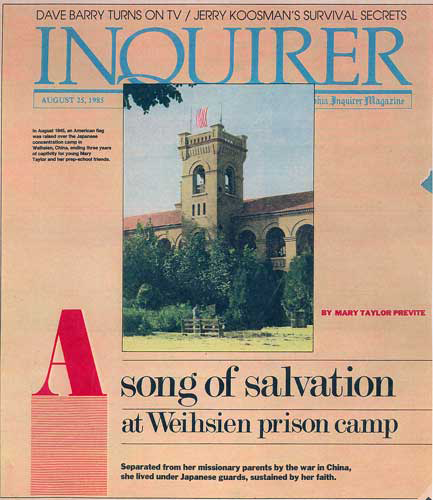
- by Mary Previte, née Taylor
[excerpts] ...
[...]
SELF-GOVERNMENT AT WEIHSIEN
ruled that every able-bodied person should work.
The prisoners did everything - cooked, baked, swabbed latrines. My older sister, Kathleen, scrubbed clothes. Jamie pumped long shifts at the water tower and carried garbage. John made coal balls. Before and after school, I mopped my square of the floor, mended clothes, stoked the fire, and carried coal dust. Not coal. The Japanese issued only coal dust.

Like every other Weihsien problem, coal dust had its dark side and its bright side. You could take your pick. You could grump yourself miserable about having only coal dust to burn; or, when you were breaking the ice in the water bucket in the morning to wash your face, you could count your blessings that you had anything at all to fuel the stove.
We younger girls made a game of carrying the coal buckets. In a long human chain - girl, bucket, girl, bucket, girl, bucket, girl - we hauled the coal dust from the Japanese quarters of the camp back to our dormitory, chanting all the way, “Many hands make light work.”
Then, in the biting cold, with frost cracked fingers, we shaped coal balls out of coal dust and clay - two shovels of coal dust, one shovel of clay and a few splashes of water. Grown-ups swapped coal ball recipes. Winter sunshine made the coal balls dry enough for burning.
One person in the camp who didn’t work at a job was Grandpa Taylor. Almost 80, and the only surviving son of J. Hudson Taylor, he had dwindled away to less than 80 pounds. His clothes bagged around his emaciated frame. “Grandpa Taylor,” people begged him, “let us take in your clothes to make them fit.”
He always smiled, his face haloed with glory: “God is going to bring me out of Weihsien,” he used to say. “And I’m going to fit in these clothes again.” (He was right: he did survive the war and was flown back to England.)
[excerpts]
Only the stouthearted could work in the butchery with the maggot-ridden carcasses. Plagues of fly-laid eggs on the meat faster than the team could wipe them off. When the most revolting-looking liver - horribly dark, with a hard, cream-colored edge - arrived with the day’s food supplies, the cooks called in our school doctor for a second opinion. Was it fit to eat? Probably an old mule, he guessed.
So we ate it.
If you wanted to see the worst in people, you stood and watched the food line, where griping and surliness were a way of life. Hungry prisoners were likely to pounce on the food servers, who were constantly being accused of dishing out more or less than the prescribed half dipper or full dipper of soup. It was a no-win job.
Having been taught self-control, we Chefoo children watched the cat fights with righteous fascination. Shrieking women in the dishwashing queue hurled basins of greasy dishwater at each other. Fights were common.
[excerpts]
An average man needs about 4,800 calories a day to fuel heavy labor, about 3,600 calories for ordinary work. Camp doctors guessed that the daily food ration for men in our camp was down to 1,200 calories. Although no one said so out loud, the prisoners were slowly starving. The signs were obvious - emaciation, exhaustion, apathy. Some prisoners had lost more than 100 pounds. Children had teeth growing in without enamel. Adolescent girls were growing up without menstruating.
That’s when our teachers discovered egg shell as a calcium supplement to our dwindling diet. On the advice of the camp doctors, they washed and baked and ground the shells into a gritty powder and spooned it into our spluttering mouths each day in the dormitory. We gagged and choked and exhaled, hoping the grit would blow away before we had to swallow. But it never did. So we gnashed our teeth on the powdered shells - pure calcium.
[excerpts]
The missionary and education community of northern China in those days was a remarkable collection of talent. Besides teaching the young, the internees organized adult education classes on topics that ranged from bookkeeping to woodworking to the study of such languages as Chinese, Japanese, Mongolian and Russian. They could also hear lectures on art or sailing or history, and they could attend lively evening discussions on science and religion, where agnostics debated Roman Catholics and Protestants about creation, miracles and the Resurrection.

[further reading]
http://www.weihsien-paintings.org/Mprevite/inquirer/MPrevite.htm
#








